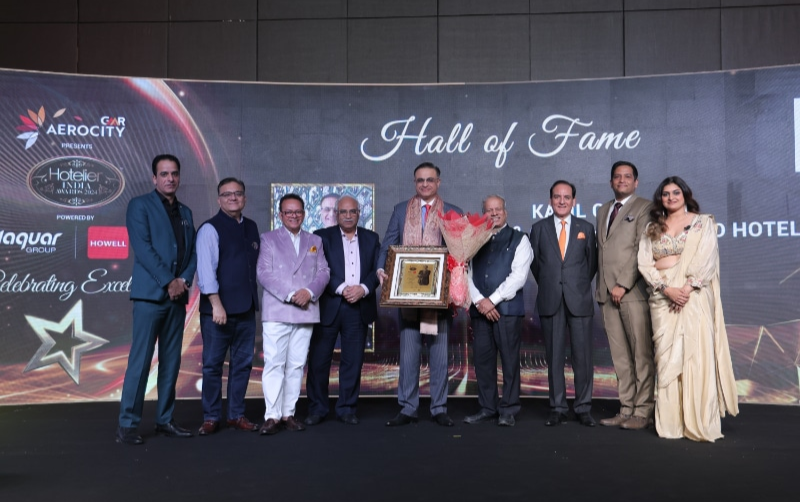Putting a stamp on his brand – The Postcard Hotels – Kapil Chopra has become quite the hotelier to contend with. Being the founder and CEO of this transformative brand, he, along with a team of seasoned luxury hoteliers Akanksha Lambha (Senior Vice President), Anirudh Kandpal and Raman Bansal, has embarked on this extraordinary journey. Chopra’s courageous move from hotelier to entrepreneur is well noted, as his last assignment was with the illustrious Oberoi Group as President of the Oberoi Hotels and Resorts at age 40. The Postcard Hotel brand hitherto has been driven by boldness and ambition, committed to redefining the rules and elevating the standards of experiential luxury.
Business India met up with Chopra of The Postcard Hotels to understand the man behind such courage. Chopra was the Chairman of WITTC-11 and now heads various tourism initiatives for the government, and was even awarded the ‘Hotelier of the year’ by the Hindustan Times. The Trail Blazer award was not far behind.
Completely setting whole new standards, Chopra has changed the narrative around personalised luxury. He has declared that The Postcard Hotel brand is the most expensive in the country, the focus being on spacious rooms and a very customer- centric approach. Despite all the challenges, he feels that there is a dire need for the creation of world-class hotels in India.

Delivering stays in the most hidden destinations since 2018, this hotelier’s homegrown brand has created a blueprint that has clicked with his travellers, who spend on high room rates and are not complaining. But that does not come without a mandate, since his hotels have an emphasis on leisure travel. Chopra usually selects locations in beach and coastal towns inspired by the sea, the mountains that offer serenity, wildlife reserves that allow guests to connect with nature, historical palaces (significantly acclaimed buildings), and wine or whisky locations (he is open to opening a future Postcard Hotel in the Champagne region of France!). The idea was that the destination was always bigger than the hotel.
A brand that debuted first in the wonderful state of Goa has four hotels now in the state. In 2020, the brand then expanded internationally to Bhutan (Postcard Dewa Thimphu) and Sri Lanka (Postcard Galle). The next was, as promised, a wildlife resort (Postcard Gir), followed by its inaugural art hotel in Kochi (Postcard Mandalay), and then in 2021 a beachfront property (Postcard on the Arabian Sea). All these already preserve local authenticity from cuisine to various experiences. “I knew that India had a big domestic market to support a super luxury brand that starts from India and takes over the world,” he says.
Quality counts
“We are on an ambitious growth path, set to launch seven new hotels in 2025, which are mentioned below, bringing our total to 18 luxury hotels across South asia. This rapid expansion positions us as the fastest- growing luxury hotel brand globally. and despite the aggressive growth, our brand is not defined by the number of rooms, but by the quality of the experience. We are opening some of the world’s finest hotels, meticulously designed and built from the ground up by our technical services teams in collaboration with renowned architects such as Luxury Frontiers, Akshat Bhat, Ashwin Alva, Rahul Kadri, and Anutosh Kanoria. Beyond our exceptional developments, we take pride in achieving the highest verified guest review score globally – 9.6 on Booking.com – the highest not just in India, but worldwide,” adds Chopra.
“Our mission statement has always been the focus of what we are building at The Postcard Hotel: excellence over mediocrity.” ambitious? yes! But it looks like this brand will be delivering on that hunch (considering the progress that it has made), as we go on to hear that the brand will launch a new property every quarter for the next 7 years, to continually provide the traveller with newer options. These hotels will be in Tirupati, Goa, Mashobra, Kanha Tiger Reserve, and the Himalayas. Let’s not forget the one he’s planning to unveil in Ranthambore (Rajasthan) – room rate: a whopping R1.95 lakh a night, plus taxes. This plush property is designed by architect Luca Franco of Luxury Frontiers.

Having already experienced the nuances of the hotel industry, his awareness of the country that enjoys showing off its heritage sites, river cruises, wildlife experiences, natural wonders, the extensive coastline with fabulous beaches – some known and others pretty unknown – can be seen in the choices that he has already made. Not forgetting the wellness and spiritual tourism that, since it has started, is just waiting to boom. Example – the recent Kumbh mela, which has drawn in 100 million visit.
Here it would be easy to add that, according to economic surveys, the travel and tourism sector has now reached pre-pandemic levels and is now known to contribute around 5 percent of the GDP. Of course, we have a long way to go. Chopra, a calculated risk-taker, was unafraid of what the pandemic brought. He ventured forth and stayed in the business; in fact, the whole idea of the brand keeping its properties small – no more than 60 rooms – with a very highly personalised service being offered, proved just the right thing during the pandemic. This was because the traveller did not want to take a chance in a large property in those trying times. Fact – The Postcard Hotels came out ahead and ran full after the first lockdown, with revenues growing 55 per cent year over year.
A blessing in disguise
What turned out to be the biggest win was that Covid forced the domestic traveller to discover his own country. The richest and the most famous had no choice but to choose to stay, and they chose the hospitality of Postcard Hotels. These guests, in turn, shared their experiences on social media, thus giving the brand its actual status and, in turn, it garnered them more PR and visibility without actually trying. It was posted that the brand spread its wings to other locations out of India as well, in Bhutan and Sri Lanka. Chopra is now looking at Austria and Africa.
What makes this homegrown brand so disruptive that it calls itself transformative? The Postcard Hotel is busy waging a war against stipulated check-in and check-out hours (unlike other established hotels); here, the traveller can check in at any time (at no extra charge). It has got rid of buffet tables; breakfast is available at any time of the day and the food is authentic and regional. alcohol is not overcharged, and they have done away with minibars. The hotels’ designs are all buildings restored with heritage in mind (no copy-paste effect). The result is that they want to build a sustainable brand, offering freshly cooked meals, in keeping with each destination’s local ethos. How sustainable, we ask? “a sustainable hotel of the future must have low construction time and cost, a long usable life, and minimal maintenance requirements.” He adapts his hotels in this very way.

Chopra just knew that he had to build a profitable hotel brand, so he started with places that guaranteed just that. according to him: “mountains get a 32 percent premium, beach resorts 41 per cent, and the jungles even more so. acknowledging that land is relatively cheaper here than in the cities, as is the payroll, it all fits well in the scheme of things.” Hotel chains, as we all know, are rarely profitable, and the challenges are many. The legal and licensing hurdles, the flip- flopping of government policies, and the underdevelopment of the tourism infrastructure all add to the pains. So here, the Postcard Hotels brand is playing with not only the big guys but also airbnb. But Chopra knows that he has the niche market sector; he knows that once people experience them, they will be back for more.
All this made us more curious as to how and where Chopra gathered that the Indian traveller was ready for this change. Chopra, being in the hotel industry, recognised some pitfalls. The common factor was simply that the founders had lost control of the brands that they had created. That’s where he felt he could fill in the gaps. He began to see the change in the type of guests visiting the Oberoi Hotels. He measured the statistics of domestic travellers versus international. He understood that there was a major shift happening, as India had a slightly richer travelling community inching up – one that was no longer feeling the guilt of expensive vacations (that came with higher rates). That in itself was a clear indication. The new traveller was ready for a new landscape. Indians were finally seeking out super- luxury in their own country.
The power of choice
People often questioned Chopra about why he could not do a Postcard-style vertical with Oberoi itself, and he replied with candour that: “Companies as a whole take a longer time to pivot, whereas as an entrepreneur one is pivoting all the time. Future travel is ever evolving, and the key is to give one’s customer the power of choice.” Well said! He made it the brand’s ultimate goal to rekindle – “the old way to holiday”, where simplicity and authenticity reign, where the guests could forge meaningful connections with local communities and positively impact the locale, thus giving back to life itself.
The future looks bright as Chopra ascertains properties in Darjeeling, the Andaman and Nicobar Islands (expansive private beach villas), etc. also on his interest list are Scottish castles, Japan, Vietnam, and Cambodia, to name a few. When asked about funding, he said he wasn’t interested in any additional funding as yet, citing that there has been a lot of interest from other players. according to him: “If you have a great business plan and a proven track record of running a business then capital is not a constraining factor.”

Chopra is not only a multi-faceted entrepreneur; he is known to be an avid contemporary art collector. Not stopping there, being from a family of doctors, he is affiliated with public health care. an initiative called chari- tybeds.com helps provide hospital aid to the underprivileged.
Chopra says: “I believe it’s still too early for an IPO. Our focus remains on strengthening and expanding our business before considering entry into the public markets.”
Coming up…
The Postcard, Tirupati – A serene sanctuary nestled near the sacred Tirumala Hills, offering divine tranquillity.
The Postcard Kanha Tiger Reserve – Immerse in wilderness luxury amidst the enchanting landscapes of Kanha and a chance to watch the tiger once again.
The Postcard Chicalim, South Goa – A hidden gem celebrating South Goa’s lush serenity and timeless charm.
The Postcard on the Rapti River, Chitwan, Nepal – A luxurious riverside retreat where you can marvel at the majestic rhinoceros, embark on serene boat trips along one of the world’s cleanest rivers, and immerse yourself in the untamed beauty of Chitwan.
The Postcard Jawai, Rajasthan – Where raw wilderness meets Rajasthan’s leopard country in unparalleled luxury.
The Postcard on the Mandovi River, Goa – Riverside elegance amidst Goa’s rich heritage and culture.
The Postcard Nainital, Uttarakhand – A lakeside haven capturing the serene essence of the Kumaon Hills.
“Post 2027, we are looking at launching a hotel every quarter. You will see one or two exceptional world-class hotels being built every quarter across the world and not just in South Asia.” So could we add that Kapil Chopra is unstoppable?

Published in Business India Magazine



